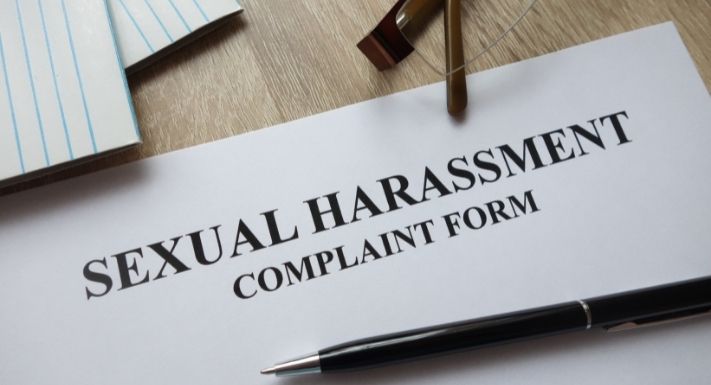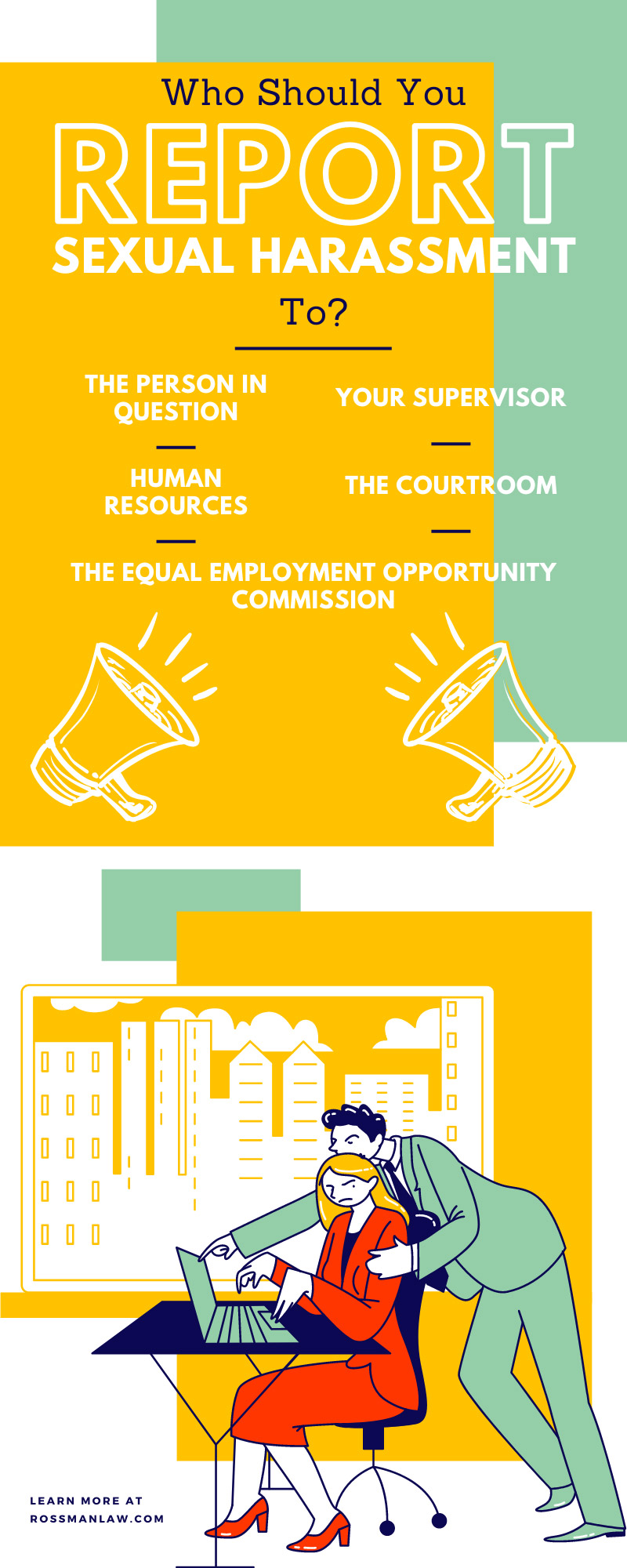
5 Mistakes To Avoid After a Car Accident
November 9, 2021
Who Is Responsible if You’re Injured While Hunting?
November 15, 2021If you’re being harassed in the workplace, sexually or otherwise, you’ve got a wide network of folks who specialize in those cases and can help you. You’re not alone in feeling anxious and violated. If someone in your workplace—a supervisor, a colleague, or a client—sexually harasses you, there’s a good chance they’re doing it to other people. Stand up for yourself, refuse to remain silent any longer, and enlist the help of the sexual harassment attorneys at Rossman Law Group to get justice. We’ve been fighting on behalf of employees’ rights for years, but we need your help to make that case. Learn who you should report sexual harassment to and take the proper steps with your complaint. Whoever is harassing you and creating a hostile workplace deserves the legal consequences of their actions, so get that process in motion today.
The Person in Question
Let’s start small. If the harassment is relatively new and if you feel comfortable doing so, tell the person who’s harassing you to knock it off. If they cease that behavior completely, great! Isolated incidents generally don’t count as sexual harassment. But if they brush off your discomfort and refuse to take no for an answer, it’s time to take the next step.
Continue to document all your interactions with this person. They might stop for a week or two and then resume their inappropriate behavior after they think you’ve forgotten about it. Keep a record of each interaction, noting dates and times.
Your Supervisor
If the harassment issue can get resolved internally, use that as your first course of action. Let your supervisor know about the person’s behavior and how it makes you feel. They’ve got a legal obligation to take sexual harassment complaints seriously and investigate them in earnest. Title VII of the Civil Rights Act forbids workplace harassment, and Idaho specifically forbids harassment based on gender. The most common gender-based harassment in the workplace is unfortunately sexual in nature.
However, not all employers follow the law. If your supervisor brushes off your complaint—or if they’re the one harassing you—take it up the ladder another step.
Human Resources
If your company has an HR department, bring your harassment complaint to them. That’s what they’re there for! Human resources departments are used to handling these kinds of complaints and may offer to mediate the conflict between you and the person harassing you. When any new employee joins your company, HR is generally responsible for offering harassment training and discouraging uncouth behavior in the workplace. In the state of Idaho, sexual harassment training isn’t mandatory—but it’s strongly recommended, and most companies do mandate that training for employees. Part of HR’s goal is to encourage employees to come forward with their complaints and prevent any retaliation against those who speak out. A company’s liability for a retaliation complaint is much greater than their liability for a harassment complaint. Your workplace has a vested interest in addressing harassment complaints before they escalate.
To bring your complaint to HR and have it formally investigated, you’ll need receipts. You’ll need a paper trail with concrete evidence that this person is harassing you. Emails, videos, witnesses—when you make your complaint, have credible evidence to offer. A good practice is to document this harassment by sending it in emails to yourself. That way, you’ll have time stamps to back you up. If you have a solid case for a harassment lawsuit, the court favors those who have complained to HR. For every step you take, you’ve got to prove you completed all the previous steps.
The Equal Employment Opportunity Commission
If you’re interested in filing a lawsuit, you must complete this step before taking your case to court. The EEOC is a federal agency that enforces Title VII of the Civil Rights Act, and they take all harassment complaints seriously. Much like your company’s HR department, the EEOC will need to see concrete evidence of the harassment to determine how to move forward. If you speak directly to an EEOC representative to discuss your options, that conversation is confidential.
However, the state of Idaho doesn’t have its own EEOC office. If you’d like to make your complaint through them, the Seattle Field Office is the nearest location and will listen to your story. Another option is the Idaho Human Rights Commission. No matter which option you choose, you’ve got 300 days from the date of the last harassment incident to formally file your complaint. If either office determines that you do have a case, they’ll likely issue you a “right-to-sue” letter, which is basically the green light to hire a lawyer. The EEOC rarely prosecutes harassment cases on its own. If and when you reach this step, it’s time to hire your own sexual harassment attorney and prepare to go to court.
The Courtroom
Once you’ve completed the above steps and confirmed that you have a solid case for a harassment lawsuit, call Rossman Law Group to back you up. When you receive that notice of a right to sue, you’ve got 90 days to get your case in front of a judge.
However, most companies—and most individuals in general—really don’t want the bad publicity of a trial. If you notify your employer of the lawsuit and show that you’re serious, there’s a good chance they’ll be willing to settle out of court.
If you do end up settling your case out of court, the guilty party will pay you damages, both compensatory and punitive. Compensatory damages will cover both economic and noneconomic costs. For example, if the trauma of your harassment ordeal caused you to start seeing a therapist, you may receive compensation for those costs. You may also get restitution for emotional distress (commonly called “pain and suffering”). Punitive damages are, as the name implies, meant to punish your harasser and discourage them from ever repeating their behavior. If you take your case to court and win, that outcome may prevent your other coworkers from being harassed in the future. It may also encourage them to speak out if it does happen!
Don’t brush off or ignore sexual harassment in the workplace. Don’t quit your job because of harassment—fight back. Rossman Law Group is dedicated to preserving workplace safety and security, and we won’t brush off your complaint. Who should you report sexual harassment to? Anyone who will listen. Make your way up the ladder and have one of our sexual harassment attorneys on your side.






